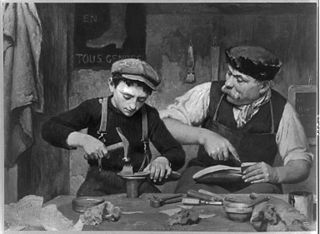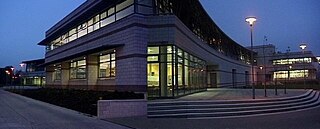
Apprenticeship is a system for training a new generation of practitioners of a trade or profession with on-the-job training and often some accompanying study. Apprenticeships can also enable practitioners to gain a license to practice in a regulated occupation. Most of their training is done while working for an employer who helps the apprentices learn their trade or profession, in exchange for their continued labor for an agreed period after they have achieved measurable competencies.
Further education in the United Kingdom and Ireland is education in addition to that received at secondary school, that is distinct from the higher education (HE) offered in universities and other academic institutions. It may be at any level in compulsory secondary education, from entry to higher level qualifications such as awards, certificates, diplomas and other vocational, competency-based qualifications through awarding organisations including City and Guilds, Edexcel (BTEC) and OCR. FE colleges may also offer HE qualifications such as HNC, HND, foundation degree or PGCE. The colleges are also a large service provider for apprenticeships where most of the training takes place at the apprentices' workplace, supplemented with day release into college.

The Waterford Institute of Technology was an institute of technology, located in Waterford, Ireland. The institute had six constituent schools and offered programmes in business, engineering, science, health sciences, as well as education & humanities.
Ireland is ranked 5th of the countries with the highest education in the world from a new survey on 9th February 2023. The levels of Ireland's education are primary, secondary and higher education. In recent years further education has grown immensely with 51% of working age adults having completed higher education by 2020. Growth in the economy since the 1960s has driven much of the change in the education system. For universities there are student service fees, which students are required to pay on registration, to cover examinations, insurance and registration costs.
An Institute of Technology (IT) is a type of higher education college found in Ireland. There are a total of fourteen colleges that use the title of Institute of Technology, which were created from the late 1960s and were formerly known as Regional Technical Colleges. The exception to this was Dublin Institute of Technology which emerged independently of the Regional College system.

The Institute of Technology, Carlow was an institute of technology, located in Carlow, Ireland. The institute had campuses in Carlow, Wexford, and Wicklow, as well as a part-time provision elsewhere in Ireland. Along with the Waterford Institute of Technology, the institute was dissolved on 1 May 2022 and was succeeded by the South East Technological University.

The Letterkenny Institute of Technology was a institute of technology, located in Letterkenny, Ireland.

A vocational school, trade school, or technical school is a type of educational institution, which, depending on the country, may refer to either secondary or post-secondary education designed to provide vocational education or technical skills required to complete the tasks of a particular and specific job. In the case of secondary education, these schools differ from academic high schools which usually prepare students who aim to pursue tertiary education, rather than enter directly into the workforce. With regard to post-secondary education, vocational schools are traditionally distinguished from four-year colleges by their focus on job-specific training to students who are typically bound for one of the skilled trades, rather than providing academic training for students pursuing careers in a professional discipline. While many schools have largely adhered to this convention, the purely vocational focus of other trade schools began to shift in the 1990s "toward a broader preparation that develops the academic" as well as technical skills of their students.

Third-level education in the Republic of Ireland includes all education after second-level, encompassing higher education in universities and colleges and further education on Post Leaving Certificate (PLC) and other courses. The degree-awarding institutions which can grant awards at all academic levels are the University of Dublin, National University of Ireland, University of Limerick, Dublin City University, Technological University Dublin, the Royal College of Surgeons in Ireland, Munster Technological University and Technological University of the Shannon: Midlands Midwest, as well as St. Patrick's College, Maynooth, and then a State agency, Quality and Qualifications Ireland, can grant awards in other institutions directly, or delegate the authority to do so. and University of Limerick. The King's Inns of Dublin has a limited role in education specialising in the preparation of candidates for the degree of barrister-at-law to practice as barristers. Medical schools in Ireland also have particular regulation. There were seven establishments of higher education within Ireland ranked among the top 500 universities worldwide by the Times Higher Education Supplement in 2008.
A Vocational Education Committee (VEC) was a statutory local education body in Ireland that administered some secondary education, most adult education and a very small amount of primary education in the state. Before 1992 VECs had authority over the Dublin Institute of Technology and the Regional Technical Colleges. They existed from 1930 to 2013, when they were replaced by Education and Training Boards.

St Patrick's, Carlow College, is a liberal arts college located in Carlow, Ireland. The college is the second oldest third level institution in Ireland and was founded in 1782 by James Keefe, then Roman Catholic Bishop of Kildare and Leighlin, and his co-adjutor bishop Daniel Delany.

Griffith College Dublin (GCD) is one of the longest-established private third level colleges in Dublin, Ireland.

Ardscoil Rís is a voluntary boys' secondary school on Griffith Avenue, Dublin, Ireland. The school caters for approximately 570 students every year.

Newbridge College, the Dominican College Newbridge, is a co-educational private fee-paying voluntary secondary school in Newbridge, County Kildare, Ireland, run by the Roman Catholic Dominican Order. The Dominican Friars founded Newbridge College in 1852 as a boarding school for boys. Today, still run by the Dominican Fathers, Newbridge College is a mixed day school with a student population of almost 1,000 pupils.
St MacDara's Community College is a secondary school situated on Wellington Lane in Templeogue, South Dublin. It is run by a board of management appointed by the Dublin and Dún Laoghaire Education and Training Board and the Catholic Archdiocese of Dublin, and including community representatives, and is a non-fee paying school.
Blackrock Further Education Institute is a college of further education in Dublin which was established in 1982. In 2014 it moved to Blackrock in a redeveloped Town Hall, Technical College and Carnegie Library. It provides both higher educational qualifications as well as technical/vocational education and training in areas including Beauty Therapy, Creative Multimedia, Marketing, Auctioneering and Estate Agency Practice, Accountancy and Design. Blackrock Further Education Institute is located in Blackrock, 17 kilometres (11 mi) from Dublin City Centre.

Bridgetown College in Bridgetown, County Wexford, Ireland, is managed by the Wexford and Waterford Education and Training Board.

Highbury College is a further education college in Portsmouth, Hampshire, England. It offers vocational and academic education and training, including apprenticeships, A-levels and foundation degrees.
Greenhills College is a secondary school situated on Limekiln Avenue, Greenhills in South Dublin. It accommodates Junior Certificate, Leaving Certificate and Leaving Certificate Applied students and offers the Leaving Certificate Vocational Programme to its students. It is run by the Dublin and Dun Laoghaire Education and Training Board (DDLETB) and is a non-fee paying school.













